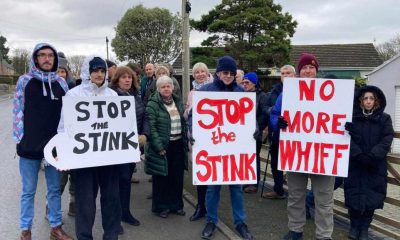Farming
Princess Eugenie visits Câr Y Môr ocean farm St Davids
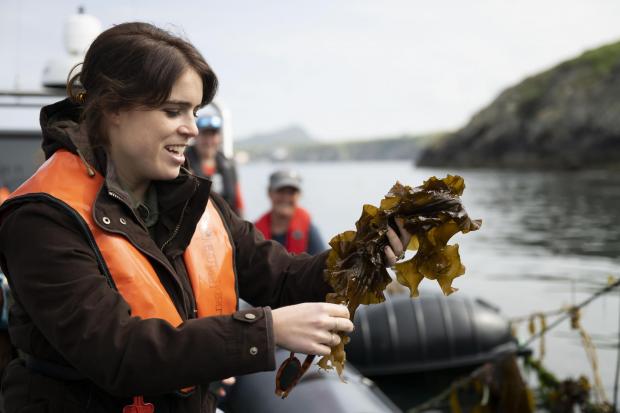
PRINCESS EUGENIE was recently spotted at a Pembrokeshire-based regenerative ocean farm.
The royal, 32, wore a dark coat underneath a life jacket for the excursion on a boat at Câr Y Môr in Pembrokeshire, Wales, with WWF-UK.
She looked at the seaweed and shellfish farm and then returned inland to see the seaweed processing facilities.
The visit was carried out to mark United Nations World Oceans Day, which is marked on June 8 as a reminder of the destruction caused by human activities such as waste, sewage disposal and oil leaks. It is not known when the visit took place.
The 32-year-old swept her brunette locks off of her face for the visit, sporting dark sunglasses.
She kept her makeup minimal and wore a dark brown corduroy jacket and black trousers.
Eugenie attended the ocean farm without husband Jack Brooksbank, 36, and their son August, one.
Câr-Y-Môr is a community benefit society which aims to improve the coast and people’s well being.
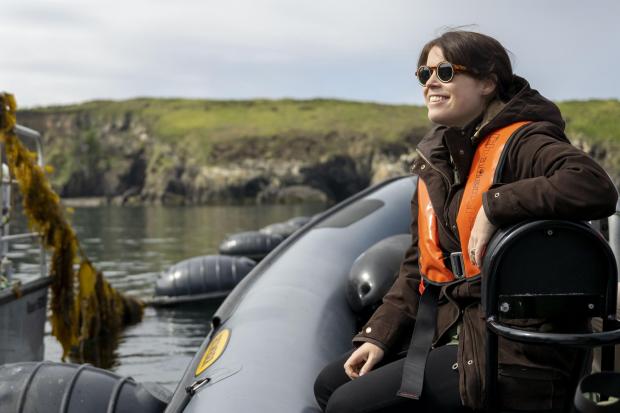
The regenerative ocean farm is an exemplar site, supported by WWF-UK, delivering no-input, low-impact marine farming.
Seaweed is easy to grow, versatile, and can help to restore ocean ecosystems. Farming seaweed is an efficient way to produce highly nutritious food for a global population, and could even help to feed animals and fertilise our land too.
Canada first proposed the idea for a World Ocean Day at the Earth Summit in Rio de Janeiro in 1992.
The aim of the day is to celebrate the world’s ocean and our personal connection to the sea, as well as raising awareness of the role it plays in our lives and the health of the environment.
Today there are in-person and online events, lectures and activities and the theme is ‘Revitalization: Collective Action for the Ocean’.
The events will ‘shed light on the communities, ideas and solutions working together to protect and revitalize the ocean and everything it sustains.’
Princess Eugenie’s appearance at the ocean farm comes after a busy weekend of Platinum Jubilee celebrations for her grandmother the Queen.
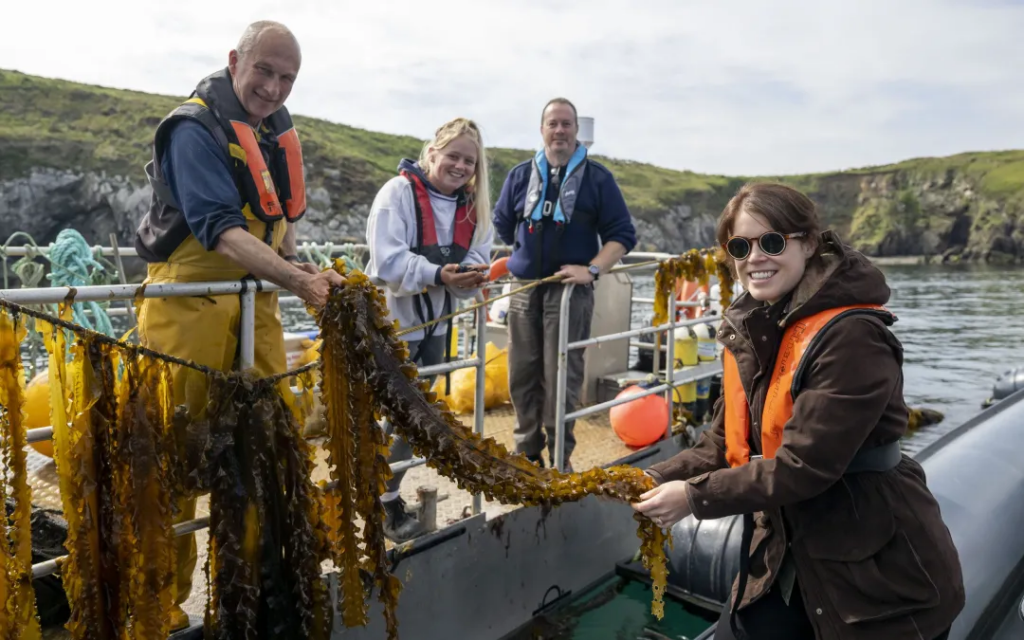
- Article syndicated from Associated Newspapers Ltd
Farming
Pembrokeshire Agricultural Society in search for county’s top progressive farmers

IF you farm in Pembrokeshire and can demonstrate your farm’s use of the latest technological methods to promote progressive, sustainable agriculture then the Pembrokeshire Agricultural Society encourage you to enter the prestigious Baron de Rutzen Award.
Adam Thorne, Pembrokeshire County Show President, said, “We are looking for local Pembrokeshire farmers, under the age of 45, who can demonstrate their farm’s use of the latest technological methods to promote progressive, sustainable agriculture. They also need to show consideration for the environment and habitat sensitivity on their farm as well as present an aesthetically pleasing example of farming in the county. The competition welcomes all livestock and arable sectors to take part.”
Last year’s winners of the Award were Mark and Caroline Davies of Little Newcastle, Haverfordwest. They milk 230 pedigree Holsteins through a fully automated system. They rear their own replacements and also have a small beef enterprise. The farm is all grassland and they follow a strict reseeding and liming policy to optimise the yield from their multi-cut silage system. The couple place significant emphasis on animal health, husbandry and breeding to maximise the efficiency of their system.
Baron John Fredrick De Rutzen was President of Pembrokeshire Agricultural Society in 1936 and the Baron de Rutzen Trophy was produced in his memory. The third Baron served in the Welsh Guards and tragically died, aged 36, in 1944.
This year’s entrants must be fully practising farmers within the county of Pembrokeshire and were under the age of 45 years on 1 January 2024. Entries can either be by nomination or direct application online on the Pembrokeshire Agricultural Society website. Click here to apply: Baron de Rutzen Award | Pembrokeshire County Show | Pembs Agricultural Society (pembsshow.org)
The closing date for nominations and applications is at noon on Wednesday, 29 May 2024.
Farming
Pembrokeshire Agricultural Society elect new president

ARABLE and beef farmer, Adam Thorne, has been unanimously elected to become the new President of Pembrokeshire Agricultural Society for the year ahead. Adam is the third generation of his family to hold the position.
During the Annual General Meeting of Pembrokeshire Agricultural Society, held last week on the Pembrokeshire Showground, Mr Tim John and his wife Margaret John were also voted in as Presidents elect.
Adam Thorne has had a long association with Pembrokeshire Agricultural Society. After visiting the show as a toddler, then helping show the family’s pedigree Herefords, his uncle got him into helping him with stewarding in his early teens. From there he progressed to being a Steward with his own section, Commercial Cattle, and then also the Butcher’s Lambs section.
From stewarding, Adam became involved with committee work, starting as an Executive and then on to the former Finance and General Purposes Committee. He has been Chairman of the Estates Committee for 12 years and is now a Board member and a Trustee.
Adam said, “I am proud of my long association with Pembrokeshire Agricultural Society. I am the third generation to now be President, following my late grandfather, Walter Thorne, my father, Robert Thorne and more recently my uncle, George Thorne. I am looking forward to my year in the prestigious position.”
Away from his work with the society, Adam runs the family’s arable and beef farm in Robeston West, Milford Haven. He has been heavily involved with Tiers Cross YFC from an early age, having been Club Secretary twice and Chairman. He has also sat on Pembrokeshire County YFC Committees and the Wales YFC Rural Affairs Committee.
The 2024 Pembrokeshire Agricultural Society officeholders, announced at the AGM, include Miss Ffion Edwards who was awarded the role of Ambassador at last year’s show. Ffion, a nurse from Maenclochog, has enjoyed many years of attending the county show and believes that there are so many good elements to it. Ffion has been a member of Llysyfran YFC for 15 years and enjoys every aspect of young farmers – trying new experiences, competing and travelling to name a few. Mrs Nicola Owen was also elected as the Honorary Treasurer.
Brian Jones, the outgoing Pembrokeshire Agricultural Society President, took the opportunity to thank everyone who had helped and supported him throughout his presidency. During his year as President, Brian and his wife Helen, raised a tremendous amount of money for various charities including the Pembrokeshire Agricultural Society, RABI, Tir Dewi and the DPJ Foundation. Brian also gave his assurances that Castell Howell will continue to sponsor the Food Hall for future years.
Pembrokeshire County Show, the largest county agricultural show in Wales, will be held over two days again this summer on 14 and 15 August. Everyone is invited to attend the celebration of rural life in the county.
Pictured (left to right): Ffion Edwards the Ambassador for 2024; Adam Thorne, President; Margaret and Tim John, the Presidents Elect.
Farming
£1,000 bursary award available to Pembrokeshire agricultural students
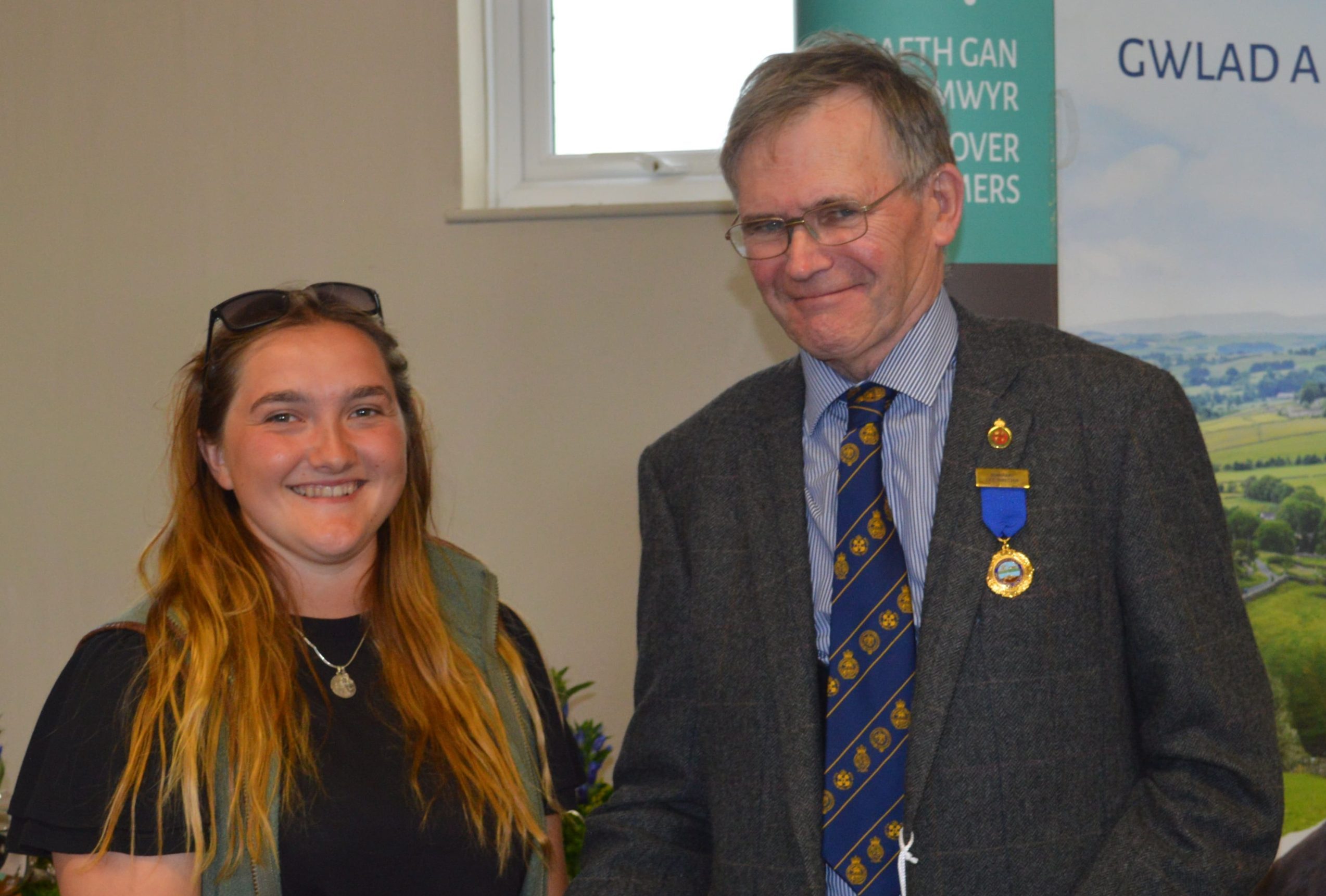
PEMBROKESHIRE Agricultural Society’s £1,000 Bursary Award is now open for applications from students studying agriculture, veterinary science, agricultural engineering, food technology, forestry or other subjects allied to agriculture.
The Student Bursary Award 2024 is available to students, from Pembrokeshire, who are currently studying or have been accepted to start their studies. They can apply for this financial support to assist with their chosen college or career path.
Last year’s winner of the award was Lottie Wilson from Hayscastle. Lottie was studying agriculture at the University of Nottingham when she applied for the bursary. When she is at home she is a general dairy farm worker as well as a lambing hand and a calving beef herd assistant. In 2021 she was the top agriculture student at Hartpury College.
Robert James, Chairman of the Society’s Bursary Committee said, “I would urge all Pembrokeshire students who study subjects that are clearly aligned to agriculture to apply for this bursary as it won’t only assist with your studies but will also give you great experiences such as undertaking an interview which is a key employment skill. It will also assist in your future career within the agriculture industry.”
“A panel of independent judges will draw up a short list of candidates who will be interviewed and the winning candidate will be asked to give a short presentation at a future meeting of the society’s show council.
“The standard of applications has always been exceptional which gives a lot of heart that there are a lot of very talented young people in our community. We are very much looking forward to receiving applications for this year’s bursary and hearing from the younger generation.”
Qualifying students must not have won the student bursary on a previous occasion, the applicant must be studying or has been accepted to study agriculture or allied subjects at a UK college or university at A-Level or higher and the applicant’s family home must be in Pembrokeshire.
The bursary is tax free and will be awarded to the student who, in the opinion of the panel of judges, has submitted the best dissertation on how the bursary will assist them to complete their course of study.
Further details and the entry form can be found online: Student Bursary Award | Pembrokeshire County Show | Pembs Agricultural Society (pembsshow.org) or by calling the show office: 01437 764331. The closing date for applications is noon on Monday, 1 July 2024.
-

 Business3 days ago
Business3 days agoBluestone National Park Resort payments expected to end
-

 Community5 days ago
Community5 days agoThe Harbourmaster: Special rail excursion draws crowds to Milford Haven
-

 News4 days ago
News4 days agoDragon LNG ‘monitoring’ scrap car blaze in Waterston
-

 News5 days ago
News5 days agoSearch for Luke, 19, reported missing in the Pembroke Dock area, continuing
-

 News2 days ago
News2 days agoSearch for missing teenager Luke continues at Pembroke Dock
-

 Crime3 days ago
Crime3 days agoEstate agents admit health and safety failings following fatal market incident
-

 News6 days ago
News6 days agoMajor search in the area of The Cleddau Bridge and Hobbs Point
-

 News2 days ago
News2 days agoMan jailed after scarring police officer in Narberth altercation







